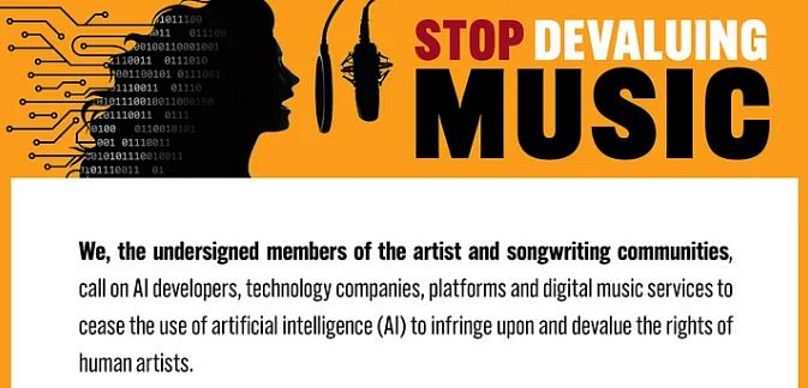Musicians vs AI. A new open letter from the Artist Rights Alliance non-profit states that when used irresponsibly, artificial intelligence "poses enormous threats to our ability to protect our privacy, our identities, our music and our livelihoods.”
More than 200 artists feature on a new open letter submitted by the Artist Rights Alliance non-profit, calling on artificial intelligence tech companies, developers, platforms, digital music services and platforms to stop using AI "to infringe upon and devalue the rights of human artists.”
Amongst those names are Stevie Wonder, Robert Smith, Billie Eilish, Nicki Minaj, R.E.M., Peter Frampton, Jon Batiste, Katy Perry, Sheryl Crow, Smokey Robinson, and the estates of Bob Marley and Frank Sinatra.
The letter, while acknowledging the creative possibilities of new AI technology, addresses some of its threats to human artistry. Those include using preexisting work to train AI models - without permissions - in an attempt to replace artists and therefore “substantially dilute the royalty pools that are paid out to artists.”
The letter states: “Make no mistake: we believe that, when used responsibly, AI has enormous potential to advance human creativity and in a manner that enables the development and growth of new and exciting experiences for music fans everywhere.”
“Unfortunately, some platforms and developers are employing AI to sabotage creativity and undermine artists, songwriters, musicians and rightsholders. When used irresponsibly, AI poses enormous threats to our ability to protect our privacy, our identities, our music and our livelihoods.”
“Unchecked, AI will set in motion a race to the bottom that will degrade the value of our work and prevent us from being fairly compensated for it,” the letter continues. “This assault on human creativity must be stopped. We must protect against the predatory use of AI to steal professional artists’ voices and likenesses, violate creators’ rights, and destroy the music ecosystem.”
The full letter is available here.
The Artist Rights Alliance is an artist-led non-profit organization that advocates for musicians in a precarious digital economy.
This is far from the first time artists have spoken out against AI, specifically when it comes to protecting performers against the potential dangers of artificial intelligence, to better ensure, for example, that generative AI tools cannot replicate an artist’s voice without their consent.
After a song which used AI to mimic the voices of Drake and The Weeknd went viral online last year, Drake voiced disapproval over the song which was generated using AI voice cloning tools - and appeared on Spotify and Apple Music before being abruptly pulled down.
Other artists have since spoken out about it, with Nick Cave labelling ChatGPT and AI songwriting as “ a grotesque mockery of what it is to be human ”, while veteran soul singer Lee Fields telling Euronews Culture that AI “will be the future artists’ greatest adversary.”
However, not all musicians oppose the use of AI across the music industry.
Canadian electro artist Grimes believes streaming services such as Spotify should have a selection dedicated to AI songs, and has even encouraged fans to use her voice "without penalty" (adding that she would split royalties on successful AI-generated tracks using her voice).
DJ David Guetta is another big name backing the use of AI tools in music, while the legendary Nile Rodgers told Euronews Culture that while using AI-generated vocals to copy another person's sound is “horrible”, using AI to “artistically express yourself and make better music is fantastic.”












